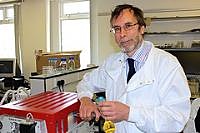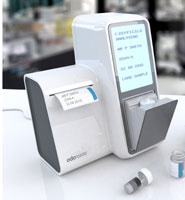A team of British researchers from the University of Liverpool and the University of the West of England (UWE Bristol) have passed an important milestone in their quest to develop a urine test for diagnosing prostate cancer. Such a test could mean that invasive prostatic diagnostic procedures that men are currently obliged to undergo will eventually be replaced by faster, simpler, non-invasive techniques that don’t require urinalysis.
The scientists working on the project describe their objective of creating a diagnostic test procedure that can “smell” cancer in a man’s urine in a paper published in the Journal of Breath Research titled “The use of a gas chromatography (GC)-sensor system combined with advanced statistical methods towards the diagnosis of urological malignancies.“ The paper is co-authored by Raphael B.M. Aggio, Ben de Lacy Costello, Paul White, Tanzeela Khalid, Norman M. Ratcliffe, Raj Persad, and Chris S.J. Probert of various departments and institutes at the University of Liverpool, the University of the West of England at Bristol, Imperial College London, and the Bristol Urological Institute.
Observing that prostate cancer is one of the most common cancers, and that serum prostate-specific antigen (PSA) is currently the gold standard used to select men to be referred for biopsies, they note that PSA use remains controversial as a diagnostic.
As an alternative, the investigators propose a GC-sensor algorithm system that would classify urine samples from patients with urological symptoms. Working in collaboration with the Bristol Urological Institute team at Southmead Hospital and Bristol Royal Infirmary, the pilot study included 155 men presenting to urology clinics, 58 of whom were diagnosed with prostate cancer, 24 with bladder cancer, and 73 with haematuria or poor stream, but cancer-free, and indicate that it is able to successfully identify different patterns of volatile compounds that allow classification of urine samples from patients with urological cancers.
The researchers found significant separation between men with prostate cancer and control samples, as well as between bladder cancer patients and controls and between bladder and prostate cancer samples. For prostate cancer diagnosis, the GC-sensor algorithm system/support vector machine (SVM) system proved able to categorize samples with 95 percent sensitivity and 96 percent specificity, while in bladder cancer diagnosis, the SVM reported 96 percent sensitivity and 100 percent specificity after leave-one-out cross-validation (LOOCV), while repeated double cross-validation (DoubleCV) reported 87 percent sensitivity and 99 percent specificity, with SVM showing 78 percent and 98 percent sensitivity between prostate and bladder cancer samples.
The scientists report results of their pilot study presented in the Journal of Breath Research paper indicate that the GC system is capable of successfully identifying patterns that allow classification of urine samples from patients with urological cancers, and that the availability of accurate diagnostics based on urine samples would reduce the number of negative prostate biopsies performed, and the frequency of surveillance cystoscopy for bladder cancer patients. They say larger cohort studies are planned to investigate their prototype system’s potential, and project that future work may lead to non-invasive breath analyses for diagnosing urological conditions.
 Prof. Chris Probert from the University of Liverpool’s Institute of Translational Medicine began work on this project with UWE Bristol where he was was previously Professor of Gastroenterology and has held a consultancy post for 12 years with clinical and research interest in inflammatory bowel disease. Probert is also chair of the IBD Section Committee for BSG and vice chair of the Medical Advisory Committee for NACC (CCUK).
Prof. Chris Probert from the University of Liverpool’s Institute of Translational Medicine began work on this project with UWE Bristol where he was was previously Professor of Gastroenterology and has held a consultancy post for 12 years with clinical and research interest in inflammatory bowel disease. Probert is also chair of the IBD Section Committee for BSG and vice chair of the Medical Advisory Committee for NACC (CCUK).
The investigative team used a gas chromatography sensor system called ‘Odoreader’ that was developed by a team led by Probert and Prof. Norman Ratcliffe at UWE Bristol. The test procedure is to insert urine samples into the Odoreader, which then measures them using algorithms developed by the University of Liverpool and UWE Bristol research team.
“There is an urgent need to identify these cancers at an earlier stage when they are more treatable as the earlier a person is diagnosed the better,” Probert said in a University of Liverpool release. “After further sample testing the next step is to take this technology and put it into a user-friendly format. With help from industry partners we will be able to further develop the Odoreader, which will enable it to be used where it is needed most: at a patient’s bedside, in a doctor’s surgery, in a clinic or Walk In Centre, providing fast, inexpensive, accurate results.”
“Like An Electronic Nose”
 “There is currently no accurate test for prostate cancer; the vagaries of the PSA test indicators can sometimes result in unnecessary biopsies, resulting in psychological toll, risk of infection from the procedure, and even sometimes missing cancer cases,” Ratcliffe said in the release. “Our aim is to create a test that avoids this procedure at initial diagnosis by detecting cancer in a non-invasive way by smelling the disease in mens’ urine. A few years ago we did similar work to detect bladder cancer following a discovery that dogs could sniff out cancer. We have been using the Odoreader, which is like an electronic nose to sense the cancer.”
“There is currently no accurate test for prostate cancer; the vagaries of the PSA test indicators can sometimes result in unnecessary biopsies, resulting in psychological toll, risk of infection from the procedure, and even sometimes missing cancer cases,” Ratcliffe said in the release. “Our aim is to create a test that avoids this procedure at initial diagnosis by detecting cancer in a non-invasive way by smelling the disease in mens’ urine. A few years ago we did similar work to detect bladder cancer following a discovery that dogs could sniff out cancer. We have been using the Odoreader, which is like an electronic nose to sense the cancer.”
 The Odoreader, which has been under development for seven years, can also be used to rapidly diagnose bladder cancer, and to sniff out gastrointestinal pathogens like Clostridium difficile, by ‘reading’ the odor of stool samples. It has a 30 meter column that enables the compounds in urine samples to travel through at different rates, thus breaking them into a readable format. These data are then translated into an algorithm enabling detection of cancer by reading patterns presented. The positioning of the prostate gland very close to the bladder gives the urine profile a different algorithm if the person undergoing the test has cancer.
The Odoreader, which has been under development for seven years, can also be used to rapidly diagnose bladder cancer, and to sniff out gastrointestinal pathogens like Clostridium difficile, by ‘reading’ the odor of stool samples. It has a 30 meter column that enables the compounds in urine samples to travel through at different rates, thus breaking them into a readable format. These data are then translated into an algorithm enabling detection of cancer by reading patterns presented. The positioning of the prostate gland very close to the bladder gives the urine profile a different algorithm if the person undergoing the test has cancer.
 “If this test succeeds at full medical trial it will revolutionize diagnostics,” Raj Prasad , consultant urologist at Southmead Hospital, North Bristol NHS Trust, said in the release. “Even with detailed template biopsies there is a risk that we may fail to detect prostate cancer in some cases. Currently indicators such as diagnosed prostatomegaly [enlarged prostate] and unusually high PSA levels can lead to recommendations for biopsy if there is a concern that cancer may be prevalent. An accurate urine test would mean that many men who currently undergo prostate biopsy may not need to do so.”
“If this test succeeds at full medical trial it will revolutionize diagnostics,” Raj Prasad , consultant urologist at Southmead Hospital, North Bristol NHS Trust, said in the release. “Even with detailed template biopsies there is a risk that we may fail to detect prostate cancer in some cases. Currently indicators such as diagnosed prostatomegaly [enlarged prostate] and unusually high PSA levels can lead to recommendations for biopsy if there is a concern that cancer may be prevalent. An accurate urine test would mean that many men who currently undergo prostate biopsy may not need to do so.”
The pilot trial was supported by the Rotary Club in Bristol, which raised funds by holding annual Run for the Future events in Bristol. The research team is now seeking funding for a full clinical trial.
A video featuring Professor Probert speaking about the research paper and explaining how the Odoreader works can be found here:
https://stream.liv.ac.uk/7zr3akrx
The full Journal of Breath Research study can be found here:
http://iopscience.iop.org/article/10.1088/1752-7155/10/1/017106

